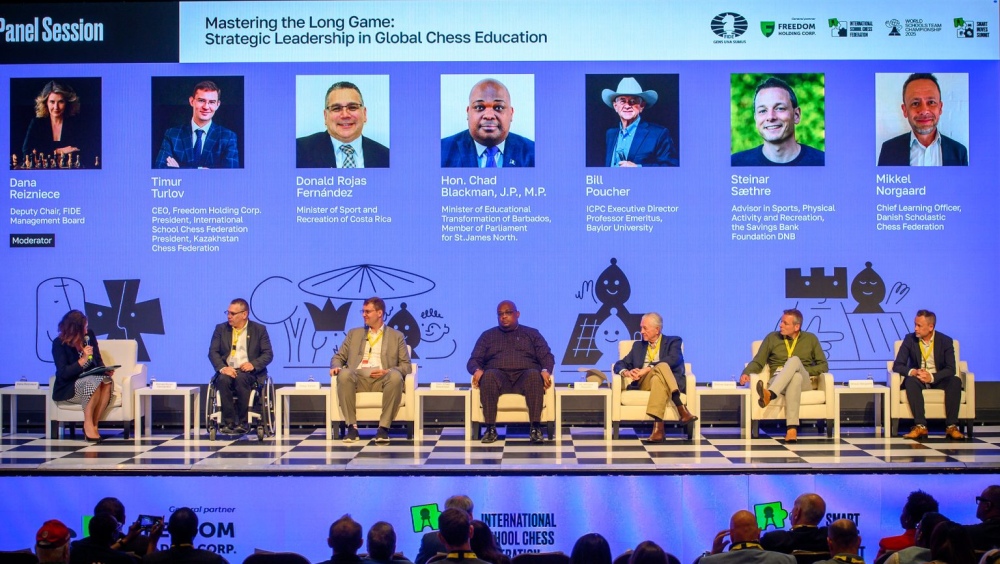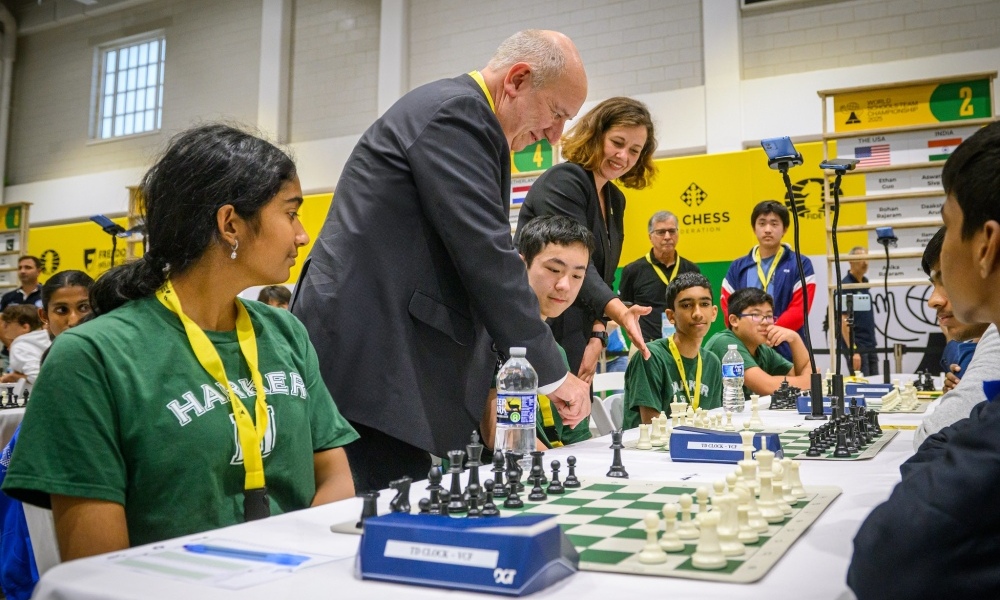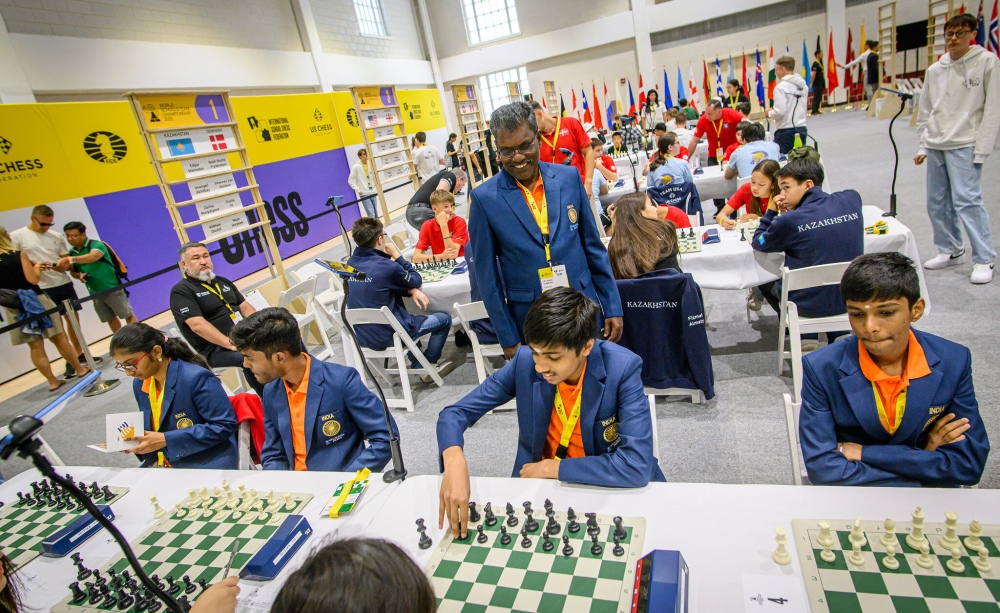Making the case for chess in the classroom: The first day of the Smart Moves Summit

The Smart Moves Summit – a first of its kind global education conference focusing on the transformative power of chess in education – opened in Washington D.C. The prestigious Episcopal High School in Alexandria will, for two days, play host to government officials, scientists, researchers, EdTech entrepreneurs, innovators, and chess experts. The international conference aims to build a global framework for cognitive development through chess and promote the game’s role in education. The Smart Moves Summit is organised by FIDE and the International School Chess Federation (ISCF), with sponsorship from Freedom Holding. Congressman Jamie Raskin, of Maryland’s 8th congressional district, opened the event. Raskin, a prominent fan of the game and a staunch supporter of chess in education, noted that the U.S. Chess Center, a significant and historically noteworthy non-profit located in his district, has taught chess to over 40,000 students. Chess as a mechanism for non-violent conflict resolution Congressman Raskin noted the importance of chess “as a mechanism for non-violent conflict resolution and strategical critical thinking”. He argued that chess is crucial to solving modern societal problems, as it promotes critical thinking over propaganda, strategic planning over impetuous behaviour, and non-violent, diplomatic resolution over violence. “Chess can be a major part of the solution to the problems that beset Humanity right now. It seems like we’ve got a bunch of choices to make, what is? Are we going to try to promote critical thinking skills among young people, or are we going to promote Dogma and propaganda in fake news and conspiracy theory,” Raskin said. He noted that, while chess promotes healthy competition, this competition is ultimately with oneself to achieve higher levels of thinking, and must be linked with a sense of community. Congressman Raskin thanked FIDE President Arkady Dvorkovich and Freedom Holding CEO Timur Turlov for organising the Smart Move Summit, stating that their work is essential “to get us through the current crisis in world affairs in politics and in government”. Fighting for focus in a fast-moving world Timur Turlov, President of the ISCF and CEO of Freedom Holding, spoke about the challenges of living in a fast-moving world and the importance of adapting educational systems. He highlighted the “ability to keep concentration” as the most valuable asset in an attention economy, and proposed that chess is an excellent tool to train this skill. Turlov gave details of an initiative to implement chess in over 500 schools in Kazakhstan, with plans for more, and mentioned that scientific studies are underway to measure the results. “We believe that the most valuable thing in our life now is our ability to keep concentration… and I really believe that chess could be a very great tool to overcome this challenge. Because chess is a very interesting game, it’s a game that can keep your attention for a long period of time and is a beautiful way to train your ability to concentrate,” Turlov said. Arkady Dvorkovich on the importance of school chess championships for children In his address, FIDE President Arkady Dvorkovich highlighted the importance of evolving educational systems to keep pace with rapid technological change. He argued that despite technological advancements, personal interaction remains key to the exchange of ideas and improvement. Advocating the vital role chess has in education, Dvorkovich pointed out that events such as school championships, which put children in different settings to their everyday lives, are an important point of communication breeding progress. “The whole idea of the World Schools Team Championship also came from that Soviet tradition,” Dvorkovich said. “My father was involved in that. By introducing chess into the educational system, we put students in these situations that are unknown in the classroom since they have to face a different world… they have to face some moves that matter, some smart moves, and they start thinking about how those pieces interact and how to think about the whole chessboard, and the surrounding, not just about one square.” Real examples: How chess is changing education and improving societies The first day of the Smart Moves Summit featured five panel discussions and a workshop. The topics included the role of chess in early and primary education, a global case study analysis on using chess to advance gender and socio-economic equality, and the opportunities of digital and educational platforms to harness the game’s power. Other sessions focused on aligning chess-based learning methodologies with public education goals, and a chess and math workshop. The central event of the day was a panel titled “Strategic Leadership in Global Chess Education,” which discussed long-term strategies, cross-sector collaboration, and how to drive initiatives to include chess as a part of official government policies. Moderated by Dana Reizniece, Deputy Chair of the FIDE Management Board and the former Latvian Minister of Finance, the session featured government officials and program heads of organisations focusing on chess in education. Timur Turlov, CEO of Freedom Holding, set the stage by describing chess education as a “long-term investment” in the mindset of an entire generation rather than “charity”, as its often seen. “Strategy, self-control, attention management, the ability to think as part of a team—these are skills no modern leader can do without,” Turlov said. “And if we want these questions to develop internationally, we must integrate chess into the education system as a core subject.” Turlov concluded by outlining his goal to build a global exchange platform for best practices in work and life principles, built through chess. The discussion quickly shifted to the political and practical implementation of chess. Costa Rican Minister of Sport and Recreation Donald Rojas Fernández shared compelling data from pilot programs, revealing a decrease in bullying and an average eight percent increase in math and science grades among students who learned chess. “The numbers don’t lie,” Fernandez stated, underscoring that the positive academic and social outcomes of implementing chess in education. This also helped influence the decision of the government of Costa Rica to make chess a national priority. Echoing this sentiment, Minister Chad Blackman of Barbados
A day of fierce matches and lasting friendships at WSTCC 2025

The World Schools Team Championship in Alexandria continued with great momentum today, as two more rounds were completed. The intensity of the competition is growing, with three teams – Kazakhstan’s National School of Physics and Mathematics, India’s Velammal MHS School, and Sri Lanka’s Royal College, Colombo still leading the standings on a perfect score. As the tournament progresses, the atmosphere on and off the board continues to reflect not just the fierce competitive spirit, but also the unique camaraderie that makes this event so special. Shortly before 10:00, the playing hall was alive with anticipation. Students filled the space, eager to begin their games. Some had started the day with a walk around the scenic grounds of Episcopal High School, enjoying another bright and sunny morning. Others spent time in the vibrant players’ lounge, where activities like air hockey, table tennis, and, naturally, casual games of chess offered a fun way to relax before the serious matches began. Despite their different routines, the shared feeling among all the participants was one of excitement and good spirits as they returned to the boards. One of the core messages of this championship is “friendship” – the kind that transcends borders and is often born through shared love for chess. This sentiment came to life today in touching ways, as players exchanged thoughtful gifts from their home countries with their opponents. From decorative trinkets to fridge magnets, these simple gestures spoke volumes about the bonds being formed. It is clear that, beyond the chessboard, meaningful connections are being made here at the World Schools Team Championship. On the competitive front, the battles are intensifying. The tournament favourite, the National School of Physics and Mathematics, has delivered a commanding performance so far, with each board maintaining a perfect score and no points dropped. Not far behind, India’s Velammal MHS School is also showcasing remarkable consistency, having conceded just a point and a half (three draws) across all rounds. Their strategy of placing lower-rated players on the top boards continues to spark intrigue. Among today’s standout performances was Sri Lanka’s Royal College, Colombo. The team made waves in the third round by stunning the 8th-seeded English side, Hampton School, with a resounding 4-0 victory. In the fourth round, they faced the third seed, University High School, and dominated the match 3:1 continuing their impressive journey on this global stage. Moment of the Day The moment of the day comes from the Round 3 match between Velammal MHS School and US The Harker School on board 2 where IM Arun Daakshin delivered a crushing final move in this position, which was met with an immediate resignation by Black. The move is 24.Qxf6!! The squares around the black king are completely dominated by White. If 24…Kxf6 then 25.Be5# game over. Looking ahead, tomorrow’s pairings promise exciting matchups as the Swiss system begins pitting the top teams against one another. With the leaderboard tightening, the battle for the championship title is about to enter a thrilling phase. Top 10 after Round 4 Smart Moves Summit Parallel to the chess battles, the Smart Moves Summit kicked off today – a two-day conference spotlighting the powerful role chess can play in shaping education. With 15 scheduled topics, the summit brings together thought leaders, educators, and policymakers to explore chess as a tool for leadership, inclusion, and innovation. The day began with an official opening ceremony and flowed into panels that addressed various themes, from global leadership in chess education and its integration in early childhood learning, to increasing inclusivity and leveraging AI in educational technology. The day concluded with a thought-provoking session on methodology, policy development, and public sector collaboration. Alongside the panels, two masterclasses provided hands-on insight into using chess for cognitive development in early learners and the dynamics of strategic gameplay. The second and final day of the Smart Moves Summit will take place tomorrow, August 5, alongside rounds 5 and 6 of the championship. As the tournament heats up and the summit continues, Alexandria remains the center of both high-level chess and meaningful dialogue about the game’s future in education. Written by: Charlize van Zyl Photos: Michal Walusza Official website: worldschoolteam2025.fide.com/
Opening moves in Alexandria: World Schools Team Championship 2025 begins

The World Schools Team Championship 2025 officially got underway at Episcopal High School, located in the historic city of Alexandria, just outside Washington, D.C. A flagship event in the global scholastic chess calendar, the tournament brings together hundreds of students representing nearly 50 countries. While the players are here to compete for international glory, the championship is equally a celebration of friendship, diversity, and shared passion for the game of chess. With participants ranging from unrated newcomers to seasoned International Masters, the tournament features a remarkable mix of talent and potential. This variety has already led to a wide spectrum of exciting games in the early rounds. At the top of the starting rankings is Kazakhstan’s National School of Physics and Mathematics, led by newly titled Grandmaster Edgar Mamedov, with a formidable average rating of 2229. Close behind is India’s Velammal MHS School, averaging 2210. The host country, the United States, is represented by four schools. Leading the American contingent is University High School, which holds third place in the starting rankings with an average team rating of 2003. The tournament’s first round began promptly at 11:30. Ceremonial first moves were made on the top four boards by distinguished guests: FIDE President Arkady Dvorkovich, President of the International School Chess Federation Timur Turlov, Minister of Educational Transformation of Barbados Hon. Chad Blackman, and Minister of Sport and Recreation of Costa Rica Donald Rojas Fernández. In the opening round, the top-seeded teams performed as expected, securing confident victories over their lower-ranked opponents. However, the second round saw the competition intensify as more closely matched teams faced off across the boards. By the end of the day, 11 teams secured wins in both rounds and concluded Day 1 with a perfect score of 4 match points. KAZ – National School of Physics and MathematIND – Velammal MHS SchoolENG – HamptonKAZ – Seed Educational ComplexNZL – Wellington CollegeSRI – Royal College, ColomboKAZ – Astana 2 RSPMUSA – The Harker SchoolSGP – Raffles InstitutionGRE – 1st General Lyceum of XanthiAUT – Privates Gymnasium Sacre Coeur Wien Moment of the day SUI – Kantonsschule Alpenquai Luzern SGP vs Raffles InstitutionBoard 4: Infanger, Philip vs Loh, Yang Hao Our moment of the day comes from board 4 in the match between Singapore’s Raffles Institution and Switzerland’s Kantonsschule Alpenquai Luzern. The match delivered one of the day’s biggest surprises, as the 19th-seeded Raffles Institution defeated the fifth seed by a commanding 3:1 score. The spotlight moment unfolded in a tense endgame after a rollercoaster battle where both sides had chances. In the critical position, White played 60.Kd5??, a decisive mistake that allowed Black to break through with 60…Kg6 61.Ke5 h5 62.gxh5 Kxh5. With the white king cut off, it could no longer stop Black’s advancing passed pawn, especially with the black king perfectly placed to shepherd it forward. Instead, the correct move was 60.Kf3, keeping the white king in front of the pawns, and ready for opposition – a key principle in pawn endgames. One possible line would be 60…Kg6 61.Kg3 h5 62.gxh5 Kxh5 63.Kh3, where the white king maintains opposition, denying Black any meaningful progress. Rounds 3 and 4 will be played on Monday, August 4, and after eight rounds, the tournament champions will be crowned on August 6. As the competition continues, so does this unique celebration of youth, talent, and international friendship through chess. Photos: Michal Walusza Official website: worldschoolteam2025.fide.com/

